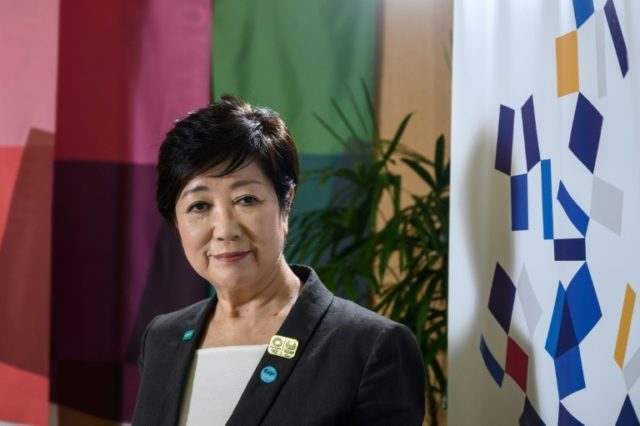Tokyo (AFP) – Tokyo governor Yuriko Koike is a conservative political veteran with a commanding media presence who has shown the toughness needed to climb the greasy pole of Japan’s male-dominated politics.
The former television anchorwoman, long seen as potentially Japan’s first female prime minister, has found herself in the national spotlight during the coronavirus pandemic, appearing daily on TV to brief the megacity’s 14 million residents.
Her calm and measured speeches, peppered with catchy slogans, have presented a sharp contrast to Prime Minister Shinzo Abe, who has been viewed as too slow to act or too rigid and opaque in his addresses.
Koike swept easily to a second term but critics say the 67-year-old’s first four years as governor were more about grabbing headlines than getting the job done.
Fluent in English, and with conversational Arabic, Koike is a rare internationalist in Japan’s navel-gazing politics.
Born in 1952 in Ashiya city in western Japan, Koike attended the region’s Kwansei Gakuin University before graduating from Cairo University in Egypt in 1976.
After a stint as a translator, she worked as a television broadcaster, interviewing Libyan leader Moamer Kadhafi and Palestinian Liberation Organisation chair Yasser Arafat.
She first won an upper house seat in 1992 before switching to the more powerful lower house the following year.
She joined the ruling Liberal Democratic Party in 2002 and became environment minister in 2003.
During Abe’s first stint as PM, Koike served as a special advisor before becoming Japan’s first female defence minister.
While she rubbed shoulders with top political figures, she enjoyed only lukewarm support inside the LDP and failed in her bid to become party chief.
When she ran in the Tokyo gubernatorial race in 2016, the LDP supported a different, male candidate.
The people of Tokyo, however, embraced her reformist zeal and gave her a landslide victory, making her the first woman governor of the Japanese capital, home to more than a tenth of Japan’s entire population.
‘Party of Hope’
The next year, she took a huge gamble in launching a new national “Party of Hope”, but support fizzled after a promising start, where it looked like she could present a serious challenge to Abe.
Her decision to stay as governor left the public unsure about who would become PM if her party won the national election and she suffered a heavy defeat at the polls.
Allies turned rivals, Koike and Abe maintained cordial working relations as they jointly prepared for the Tokyo Olympics, which would have been a major political legacy for both of them.
But the coronavirus pandemic forced a one-year delay of the Games after costly preparations.
Koike quickly shifted her focus to the fight against the infection, giving daily media briefings and issuing warnings to Tokyoites that worse was to come.
She repeated catchy anti-virus slogans in her televised addresses to encourage the entire nation to stay home and avoid crowds.
In her re-election bid, Koike comfortably ran an independent, online-only campaign, with senior LDP members opening supporting her bid.

COMMENTS
Please let us know if you're having issues with commenting.